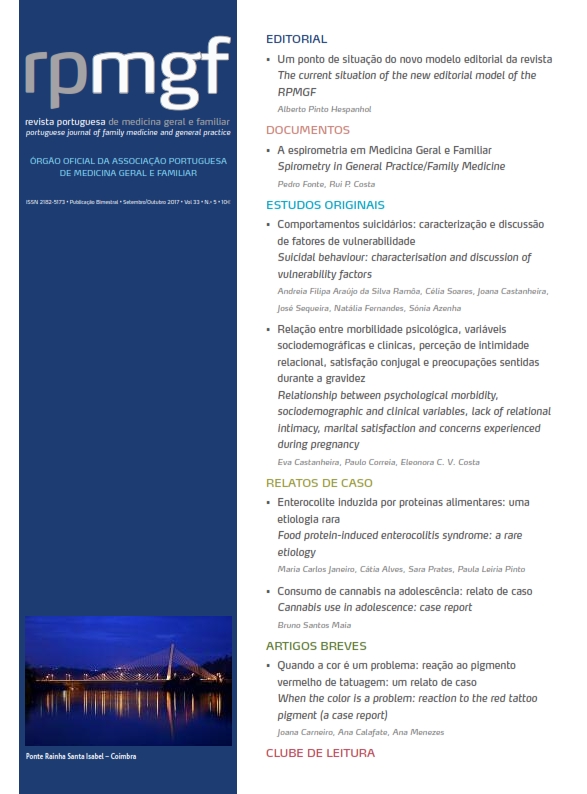Cannabis use in adolescence: case report
DOI:
https://doi.org/10.32385/rpmgf.v33i5.12263Keywords:
Illicit drugs, Cannabis, Adolescent, Family.Abstract
Introduction: The illicit use of drugs has increased among adolescents. These are a risk group and cannabis is the drug preferentially used. Drug abuse is a clinical indication for family assessment. The aim is to alert illicit drug use in adolescence and emphasize the importance of family assessment and brief intervention by the family doctor. Case description: A 18-year-old adolescent male, belonging to a nuclear family at stage V of the Duvall cycle and middle social class, living with his parents with deafness and a 14-year-old sister. Family history of alcoholism. Initiated cannabis use at age 16 and regular use motivated school failure. In April 2015 with complaints of irritability and loss of motivation, associated with lack of concentration. Complaints were justified by the revolt in relation to deaf parents. In Family Circle, the adolescent put his sister in the center of the family and parents apart. According to the Family APGAR, it was a family with moderate dysfunction. It was decided not to intervene with family because it was not considered a high-risk situation and to not go against the adolescent will. Advice was provided to drug abuse, adapted to the stage of change. In September 2015 stopped using cannabis, remaining abstinent in March 2016 and more motivated at school. The maintenance of abstinence and prevention of relapse were promoted. Comment: The family continues to be the most consistent social support. The family dynamics can be prejudiced when parents, especially deaf, deal with the problems of adolescents, increasing the risk of illicit drug use. The family assessment and evaluation of the motivation for change by the family doctor are essential because only in this way is possible to improve doctor-patient relationship and chances of therapeutic success.Downloads
Downloads
Published
Issue
Section
License
The authors will assign to the RPMGF the sole right to publish and distribute the content of the manuscript specified in this declaration via physical, electronic, broadcasting or any other medium that may come into existence. They also grant the RPMGF the right to use and exploit this manuscript, in particular by assigning, selling or licensing its content. This permission is permanent and takes effect from the moment the manuscript is submitted, has the maximum duration allowed by applicable Portuguese or international law and is of worldwide scope. The authors further declare that this assignment is made free of charge. If the RPMGF informs the authors that it is not going to publish their manuscript, the exclusive assignment of rights ceases forthwith.
The authors authorise the RPMGF (or any entity it may appoint) to act on their behalf when it believes that copyright may have been infringed.





